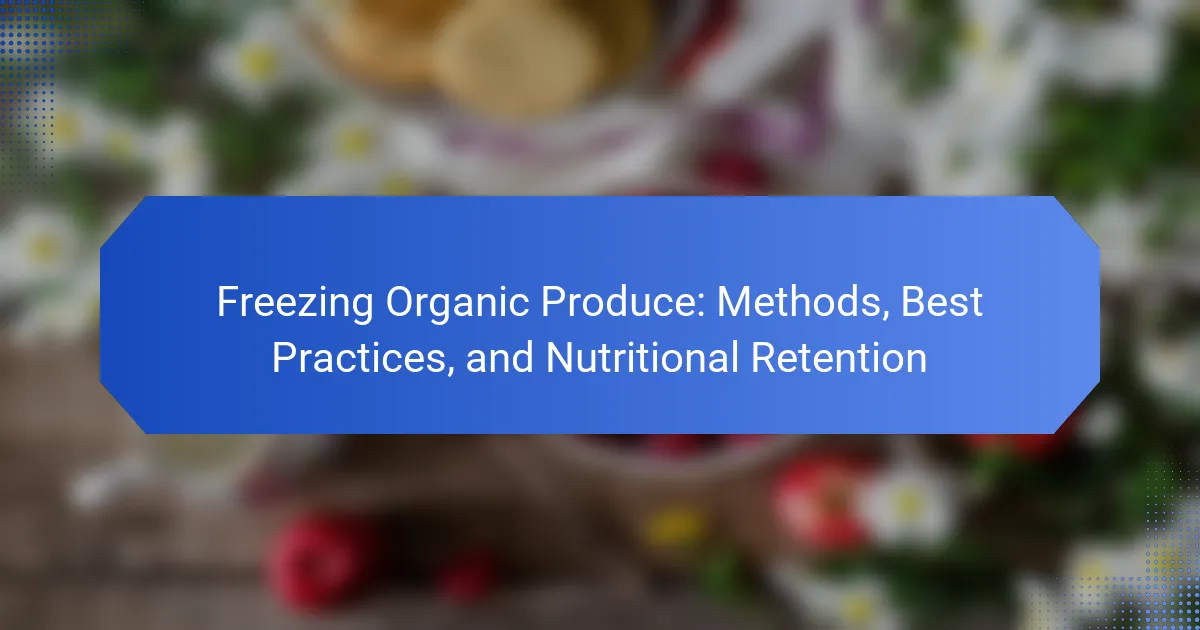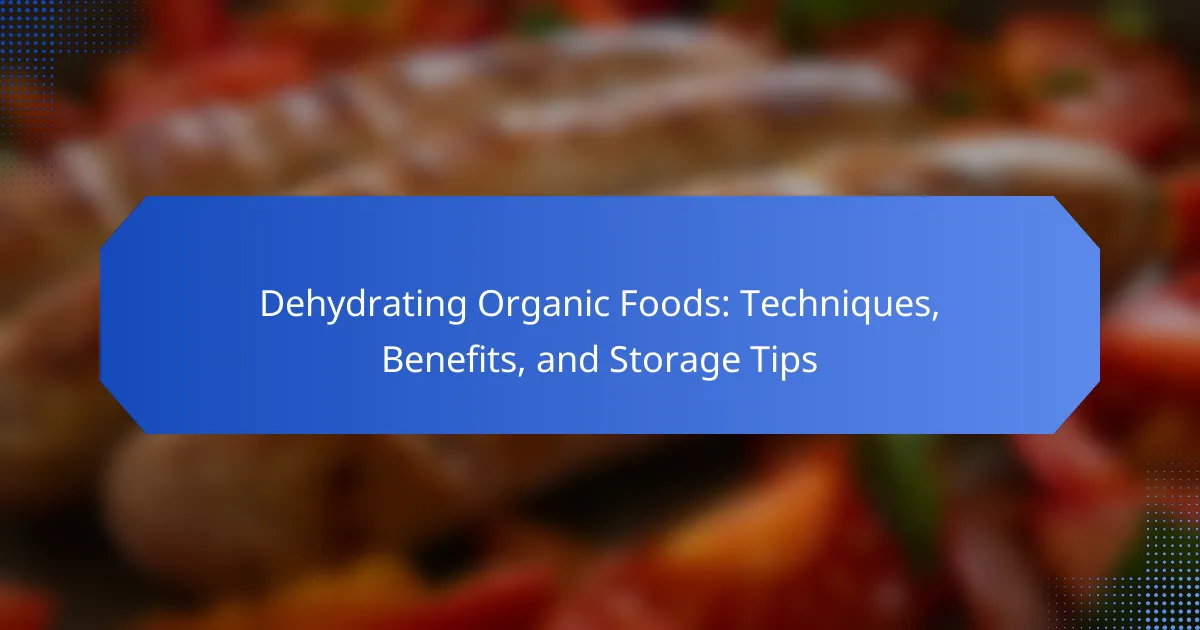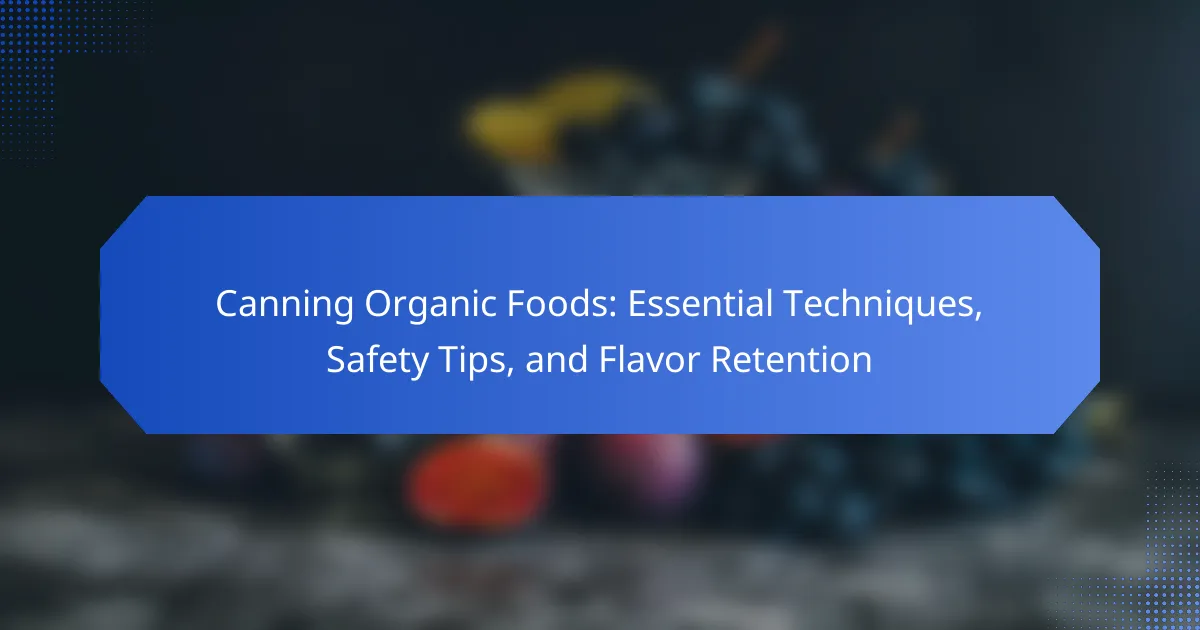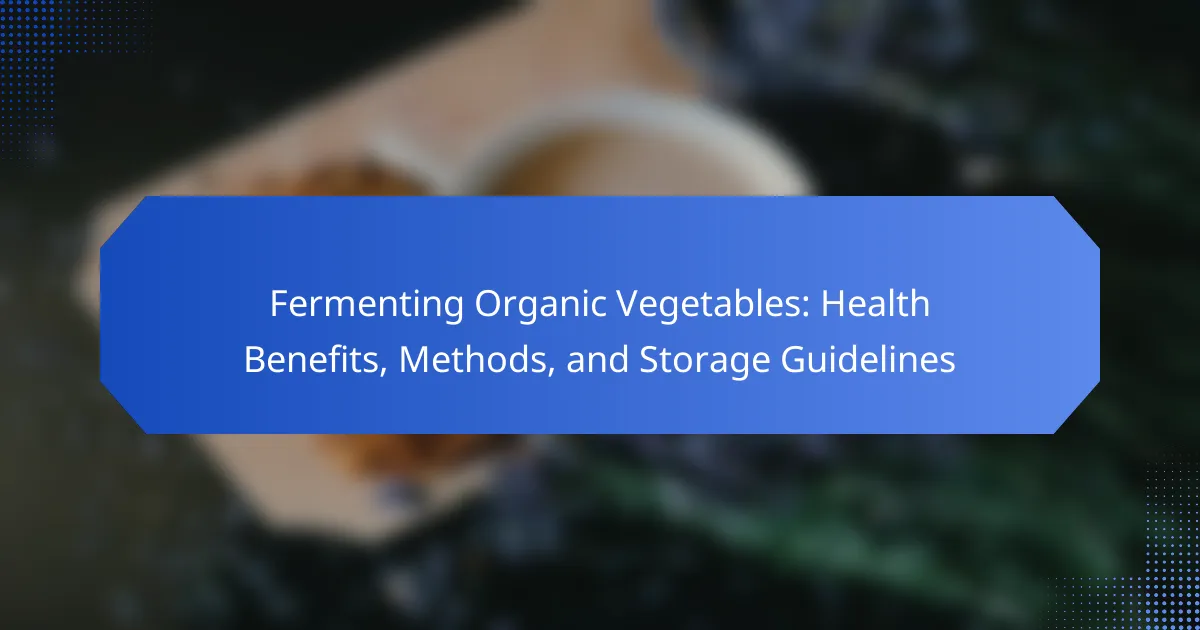Preserving organic fruits involves techniques such as canning, freezing, drying, and fermenting, each designed to extend shelf life while maintaining quality. Canning can prolong usability for up to a year, while freezing halts enzymatic activity, preserving flavor and nutrients for several months. Drying prevents spoilage by removing moisture and can allow fruits to last for years, and fermenting enhances flavor through beneficial bacteria. Refrigeration can keep organic fruits fresh for 1 to 3 weeks, depending on the fruit type and ripeness, but preserved fruits generally have lower nutritional value compared to fresh ones, with potential losses in vitamins, fiber, and antioxidants. Understanding these methods and their effects on shelf life and nutrition is essential for effective fruit preservation.
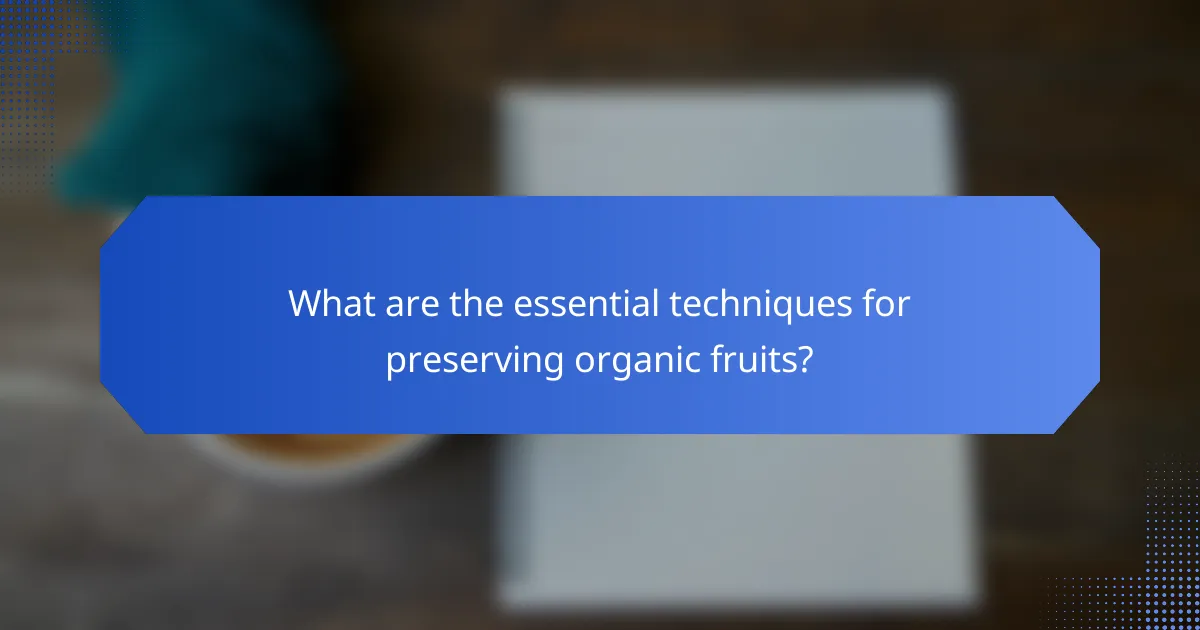
What are the essential techniques for preserving organic fruits?
The essential techniques for preserving organic fruits include canning, freezing, drying, and fermenting. Canning involves sealing fruits in jars and heating them to kill bacteria. This method can extend shelf life for up to a year. Freezing preserves fruits by halting enzymatic activity. This technique maintains flavor and nutrients for several months. Drying removes moisture, thus preventing spoilage. Dehydrated fruits can last for years when stored properly. Fermenting uses beneficial bacteria to create a tangy flavor while preserving the fruit. Each method effectively prolongs the usability of organic fruits while maintaining their quality.
How do different preservation methods impact the quality of organic fruits?
Different preservation methods can significantly impact the quality of organic fruits. Methods such as refrigeration, freezing, and dehydration help maintain freshness and nutrients. Refrigeration slows down ripening and microbial growth, preserving flavor and texture. Freezing retains most vitamins but may alter texture upon thawing. Dehydration removes moisture, extending shelf life but can concentrate sugars and reduce some nutrients. Each method has trade-offs that affect taste, texture, and nutritional value. Studies show that refrigeration retains more vitamin C compared to other methods. Thus, selecting the appropriate preservation technique is crucial for maintaining organic fruit quality.
What are the advantages and disadvantages of canning organic fruits?
Canning organic fruits has several advantages and disadvantages. One advantage is extended shelf life. Canned organic fruits can last for years without refrigeration. This makes them a convenient option for off-season consumption. Canning preserves the fruits’ nutritional value to a significant extent. It retains vitamins and minerals better than some other preservation methods.
On the downside, canning can alter the texture of the fruits. The process may lead to a softer consistency compared to fresh fruits. Additionally, the canning process can result in a loss of some heat-sensitive nutrients. Canned organic fruits may also contain added sugars or preservatives. This can impact their overall health benefits.
In summary, canning organic fruits offers convenience and longevity but may compromise texture and some nutritional content.
How does freezing affect the texture and flavor of organic fruits?
Freezing organic fruits alters their texture and flavor. The freezing process causes ice crystals to form within the fruit. These ice crystals can rupture cell walls, leading to a softer texture upon thawing. This texture change is particularly noticeable in fruits with high water content, such as strawberries and watermelon.
Flavor can also be affected by freezing. Some volatile compounds responsible for flavor may diminish during freezing. However, freezing can preserve the overall taste profile if done quickly and at low temperatures. Rapid freezing minimizes ice crystal formation and helps retain flavor.
Research indicates that fruits frozen at their peak ripeness maintain better flavor and nutritional value. A study published in the Journal of Food Science found that freezing can preserve vitamin C levels in fruits effectively.
What role does dehydration play in preserving organic fruits?
Dehydration plays a crucial role in preserving organic fruits by removing moisture content. This process inhibits the growth of microorganisms and slows down enzymatic reactions that cause spoilage. By reducing water activity, dehydration extends the shelf life of fruits significantly. Studies show that dehydrated fruits can last for months or even years when stored properly. Additionally, dehydration retains most of the nutrients, making it a preferred method for preserving organic fruits. For example, dried apples retain about 85% of their vitamin C content compared to fresh apples. Thus, dehydration is an effective technique for maintaining the quality and safety of organic fruits over time.
What are the best practices for each preservation technique?
Best practices for preservation techniques include methods like canning, freezing, drying, and fermenting. For canning, ensure jars are sterilized and filled while hot to prevent bacteria. Use proper sealing techniques to maintain an airtight environment. In freezing, use airtight containers to prevent freezer burn. Blanching fruits before freezing retains color and nutrients. For drying, use a dehydrator or an oven at low temperatures to remove moisture efficiently. Ensure fruits are sliced evenly for uniform drying. In fermenting, maintain clean equipment to avoid unwanted bacteria. Monitor temperatures and conditions for optimal fermentation. Each technique’s effectiveness relies on following these specific practices to ensure quality preservation.
How can you effectively can organic fruits at home?
To effectively can organic fruits at home, start by selecting fresh, ripe fruits. Wash the fruits thoroughly to remove dirt and pesticides. Cut the fruits into appropriate sizes and remove any pits or cores. Prepare jars by sterilizing them in boiling water for 10 minutes. Fill the jars with the prepared fruits, leaving some headspace. Add sugar syrup, juice, or water to cover the fruits completely. Seal the jars with sterilized lids. Process the jars in a boiling water bath for the recommended time, which varies by fruit type. Allow the jars to cool before storing them in a cool, dark place. This method ensures long-term preservation and maintains the fruits’ nutritional value.
What steps should be taken to freeze organic fruits properly?
To freeze organic fruits properly, first wash the fruits thoroughly under running water. This removes dirt and pesticides. Next, peel, core, or slice the fruits as needed. Cutting them into smaller pieces helps with even freezing. Then, spread the fruits in a single layer on a baking sheet. This prevents them from sticking together. Place the baking sheet in the freezer for a few hours until the fruits are solid. After they are frozen, transfer the fruits to airtight containers or freezer bags. Remove as much air as possible to prevent freezer burn. Finally, label the containers with the date and type of fruit. This ensures easy identification later. Following these steps helps maintain the quality and flavor of organic fruits during storage.
What methods are recommended for dehydrating organic fruits?
Recommended methods for dehydrating organic fruits include air drying, oven drying, and using a food dehydrator. Air drying involves placing fruits in a well-ventilated area with low humidity. This method can take several days depending on the fruit type. Oven drying requires setting the oven to a low temperature, typically around 140°F. Fruits are spread on a baking sheet and monitored closely to prevent cooking. A food dehydrator is specifically designed for this purpose. It circulates warm air around the fruits, ensuring even drying. Each method retains the nutritional value of the fruits while extending their shelf life.

How long can organic fruits be preserved using these techniques?
Organic fruits can typically be preserved for 1 to 3 weeks using refrigeration techniques. The exact duration depends on the type of fruit and its ripeness at the time of preservation. For instance, berries may last up to a week, while apples can remain fresh for several weeks. Proper storage methods, such as using airtight containers, can extend shelf life. Research indicates that maintaining optimal temperature and humidity levels significantly impacts preservation duration. Studies show that refrigeration slows down the ripening process, thereby prolonging freshness.
What factors influence the shelf life of preserved organic fruits?
The shelf life of preserved organic fruits is influenced by several key factors. These include storage temperature, humidity levels, and the method of preservation used. For example, lower storage temperatures can significantly extend shelf life by slowing down microbial growth. High humidity can lead to mold growth, reducing shelf life. Preservation methods such as canning, freezing, or drying also play a crucial role. Each method affects the fruit’s moisture content and exposure to air, which can impact spoilage rates. Additionally, the ripeness of the fruit at the time of preservation is important. Overripe fruits may spoil faster than those preserved at optimal ripeness. Lastly, packaging materials can influence shelf life by providing barriers to oxygen and moisture.
How do storage conditions affect the longevity of canned organic fruits?
Storage conditions significantly impact the longevity of canned organic fruits. Proper storage in a cool, dark place extends their shelf life. High temperatures can lead to faster degradation of quality and nutrients. Exposure to light can also cause color and flavor loss. Humidity levels should be controlled to prevent rusting of can lids. Canned fruits stored at consistent temperatures can last up to two to three years. In contrast, fluctuating temperatures can reduce shelf life considerably. Studies indicate that maintaining optimal storage conditions preserves both taste and nutritional value effectively.
What is the typical shelf life of frozen organic fruits?
The typical shelf life of frozen organic fruits is about 8 to 12 months. This duration can vary based on the type of fruit and storage conditions. For optimal quality, fruits should be stored at a consistent temperature of 0°F (-18°C) or lower. Proper packaging also plays a crucial role in maintaining freshness. Vacuum-sealed bags can help prevent freezer burn. Research indicates that while frozen fruits remain safe to eat beyond 12 months, their taste and texture may deteriorate over time.
How does humidity impact the preservation of dehydrated organic fruits?
Humidity negatively impacts the preservation of dehydrated organic fruits. High humidity levels can lead to moisture absorption by the fruits. This moisture can cause the growth of mold and bacteria. Increased humidity can also result in the rehydration of the fruits. Rehydrated fruits lose their texture and nutritional quality. The ideal storage environment for dehydrated fruits is low humidity. Studies show that maintaining humidity below 60% can extend shelf life. Proper packaging can also mitigate humidity effects.
What signs indicate that preserved organic fruits have spoiled?
Signs that indicate preserved organic fruits have spoiled include discoloration, mold growth, and off odors. Discoloration may appear as dark spots or an overall dull appearance. Mold growth can be fuzzy or powdery and is often green, white, or black. Off odors are typically sour or fermented, signaling spoilage. Additionally, a change in texture, such as excessive softness or mushiness, can indicate that the fruit is no longer safe to eat. If the container is bulging or leaking, this is a strong sign of spoilage as well.
How can you identify spoilage in canned organic fruits?
Check for bulging lids on canned organic fruits. Bulging indicates gas buildup from spoilage. Examine the can for rust or dents. These may compromise the seal and lead to spoilage. Open the can and smell the contents. A sour or off odor suggests spoilage. Inspect the fruit’s appearance. Discoloration or mold indicates it is no longer safe to consume. Finally, note the expiration date. Consuming fruits past this date increases the risk of spoilage.
What are the visual and sensory cues of spoilage in frozen organic fruits?
Visual and sensory cues of spoilage in frozen organic fruits include discoloration, off-odors, and freezer burn. Discoloration may manifest as dark spots or a faded appearance. Off-odors often indicate microbial growth or chemical changes. Freezer burn appears as dry, white patches on the surface. These changes can affect the texture and flavor, making them less appealing. Consuming spoiled frozen organic fruits can lead to foodborne illnesses. Proper storage and monitoring can help prevent spoilage.
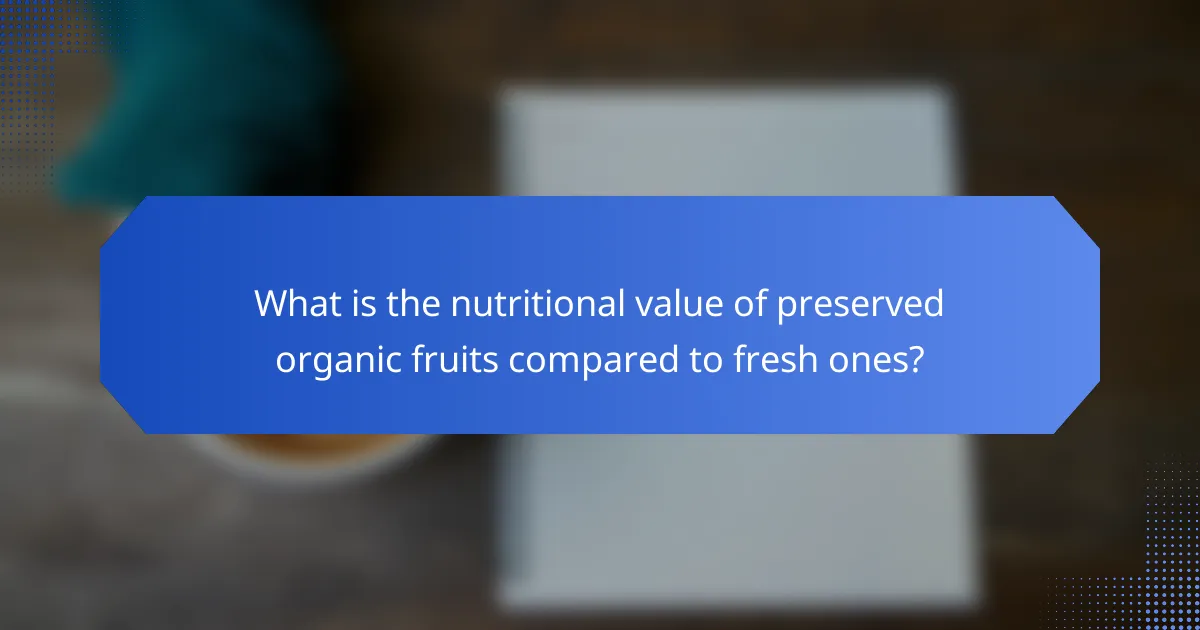
What is the nutritional value of preserved organic fruits compared to fresh ones?
Preserved organic fruits typically have lower nutritional value compared to fresh organic fruits. Fresh fruits contain higher levels of vitamins, particularly vitamin C, which can degrade during the preservation process. For example, fresh strawberries contain about 58 mg of vitamin C per 100 grams, while preserved strawberries may have significantly less due to heat exposure during processing. Additionally, the fiber content can be affected, with some preserved fruits losing texture and fiber density. Antioxidants can also diminish in preserved fruits, impacting their health benefits. Research indicates that while some nutrients remain stable, others are lost, making fresh fruits generally more nutrient-dense.
How does the preservation process affect the nutritional content of organic fruits?
The preservation process can significantly impact the nutritional content of organic fruits. Techniques like freezing, drying, and canning can lead to nutrient loss. For instance, freezing preserves most vitamins but may reduce some antioxidants. Drying can concentrate sugars and reduce vitamin C levels. Canning often results in the loss of water-soluble vitamins. Studies show that fresh organic fruits contain higher levels of nutrients compared to preserved ones. According to research published in the Journal of Agricultural and Food Chemistry, fresh fruits retain 100% of their vitamins, while canned fruits may lose up to 50% of certain nutrients.
What vitamins and minerals are retained during canning?
Canning retains several vitamins and minerals, primarily vitamin C, vitamin A, and potassium. Research indicates that while some nutrients degrade during the canning process, many remain intact. For instance, studies show that canned fruits can retain up to 80% of their vitamin C content. Similarly, vitamin A levels are often preserved well due to the sealed environment during canning. Potassium is also retained effectively, contributing to the nutritional value of canned produce. Overall, while there is some nutrient loss, significant amounts of essential vitamins and minerals are still available in canned foods.
How does freezing impact the antioxidant levels in organic fruits?
Freezing can preserve antioxidant levels in organic fruits effectively. Studies show that freezing maintains or even enhances certain antioxidants, such as vitamin C and phenolic compounds. For instance, a study published in the Journal of Agricultural and Food Chemistry found that frozen strawberries retained 90% of their vitamin C content after six months. Additionally, the freezing process slows down enzymatic activity, which can lead to antioxidant degradation. However, some antioxidants may decrease slightly due to cellular damage during freezing. Overall, freezing is an effective method to retain the nutritional value of organic fruits, including their antioxidants.
Are there any health benefits associated with consuming preserved organic fruits?
Yes, there are health benefits associated with consuming preserved organic fruits. Preserved organic fruits retain many nutrients found in fresh fruits. They are often rich in vitamins, minerals, and antioxidants. These nutrients can support immune function and overall health. Additionally, preserved organic fruits can provide dietary fiber, aiding in digestion. Studies indicate that antioxidants in fruits may reduce the risk of chronic diseases. For example, a review published in the Journal of Agricultural and Food Chemistry highlights the health benefits of antioxidants in preserved fruits. This makes them a valuable addition to a balanced diet.
How do preserved organic fruits contribute to a balanced diet?
Preserved organic fruits contribute to a balanced diet by providing essential nutrients and dietary fiber. They retain many vitamins, minerals, and antioxidants found in fresh fruits. For instance, preserved fruits often contain vitamin C, which supports the immune system. They also offer dietary fiber that aids in digestion and helps maintain healthy cholesterol levels.
Moreover, preserved organic fruits can be convenient and versatile. They can be easily incorporated into meals, snacks, and desserts. This accessibility encourages fruit consumption, which is vital for a balanced diet.
Research shows that consuming fruits, whether fresh or preserved, is linked to a lower risk of chronic diseases. A study published in the Journal of Nutrition found that fruit intake is associated with reduced cardiovascular disease risk. Therefore, preserved organic fruits can effectively complement a balanced diet while ensuring nutrient intake.
What role do preserved organic fruits play in food security?
Preserved organic fruits enhance food security by providing a stable food source. They extend the availability of seasonal fruits throughout the year. This helps mitigate food shortages during off-seasons. Preserved fruits retain essential nutrients, making them a valuable dietary component. They also reduce food waste by utilizing surplus produce. According to the Food and Agriculture Organization, food preservation techniques can significantly increase food availability. By ensuring a consistent supply, preserved organic fruits contribute to nutritional diversity. Their role in food security is crucial, especially in regions with limited access to fresh produce.
What are some practical tips for maximizing the benefits of preserved organic fruits?
To maximize the benefits of preserved organic fruits, store them in a cool, dark place. This helps maintain their nutritional value and flavor. Use airtight containers to prevent moisture and air exposure. This reduces the risk of spoilage and nutrient loss. Incorporate preserved fruits into meals for added fiber and vitamins. For example, add them to smoothies or oatmeal. Rehydrate dried fruits before consumption to enhance digestibility and taste. This can be done by soaking them in water or juice. Lastly, check for expiration dates to ensure optimal quality and safety. Preserved organic fruits can retain nutrients for up to a year when stored properly.
The main entity of the article is organic fruits and their preservation techniques. The article provides an overview of essential methods for preserving organic fruits, including canning, freezing, drying, and fermenting, along with their impacts on quality and nutritional value. It discusses the advantages and disadvantages of each preservation method, best practices for implementation, and factors influencing shelf life. Additionally, the article highlights the nutritional content of preserved organic fruits compared to fresh ones, their role in food security, and practical tips for maximizing their benefits.
